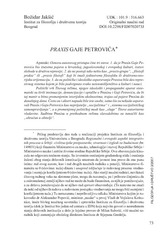Praxis Gaje Petrovića
Апстракт
The author’s approach is based on three premises: 1. that Gajo Petrović’s
Praxis was an outstanding phenomenon in Croatian, Yugoslav and European culture,
a challenge of freedom in a repressive society; 2. that there has never been such a
thing as “Praxis group”, “philosophers of practice” or “Praxis philosophers” with a
unified philosophical and socio-theoretical orientation; and 3. that political and ideo
-
logical attacks on Praxis were part of the repressive system that targeted every in
-
stance of cultural and scientific dissent.
The political leadership of Tito’s regime, its ideological and propaganda appa
-
ratus systematically disseminated allegations, denunciations and accusations against
Praxis and Gajo Petrović. The same style
has survived through radical historical
changes from the appearance of Praxis until today. The attackers have often been the
same persons, with the difference that in earlier times they denounced Praxis and Gajo
Petrović as enemies of ...“socialism” and the “socialist self-management system”, and in
the changed political fashion as “servants” of Tito’s authoritarian rule. The fate of
Praxis in the former regime has been trium
phantly interpreted as a “family quarrel”.
This paper attempts a sociological analysis of the political destiny of Praxis.
The analysis is essentially determined not by old and new political and ideological
questionings of Praxis, but by Gajo Petrović’s fundamental belief that there is no
freedom without the human or humanity without freedom
Кључне речи:
praxis / Korčulanska ljetnja škola / critical thought / freedomИзвор:
Filozofija i društvo / Philosophy and Society, 2007, 73-98Издавач:
- Beograd: Institut za filozofiju i društvenu teoriju
Финансирање / пројекти:
- Регионални и европски аспекти интегративних процеса у Србији: цивилизацијске претпоставке, стварност и изгледи за будућност (RS-MESTD-MPN2006-2010-149031)
Институција/група
IFDTTY - JOUR AU - Jakšić, Božidar PY - 2007 UR - http://rifdt.instifdt.bg.ac.rs/123456789/34 AB - The author’s approach is based on three premises: 1. that Gajo Petrović’s Praxis was an outstanding phenomenon in Croatian, Yugoslav and European culture, a challenge of freedom in a repressive society; 2. that there has never been such a thing as “Praxis group”, “philosophers of practice” or “Praxis philosophers” with a unified philosophical and socio-theoretical orientation; and 3. that political and ideo - logical attacks on Praxis were part of the repressive system that targeted every in - stance of cultural and scientific dissent. The political leadership of Tito’s regime, its ideological and propaganda appa - ratus systematically disseminated allegations, denunciations and accusations against Praxis and Gajo Petrović. The same style has survived through radical historical changes from the appearance of Praxis until today. The attackers have often been the same persons, with the difference that in earlier times they denounced Praxis and Gajo Petrović as enemies of “socialism” and the “socialist self-management system”, and in the changed political fashion as “servants” of Tito’s authoritarian rule. The fate of Praxis in the former regime has been trium phantly interpreted as a “family quarrel”. This paper attempts a sociological analysis of the political destiny of Praxis. The analysis is essentially determined not by old and new political and ideological questionings of Praxis, but by Gajo Petrović’s fundamental belief that there is no freedom without the human or humanity without freedom PB - Beograd: Institut za filozofiju i društvenu teoriju T2 - Filozofija i društvo / Philosophy and Society T1 - Praxis Gaje Petrovića SP - 73 EP - 98 DO - 10.2298/FID0702073J ER -
@article{
author = "Jakšić, Božidar",
year = "2007",
abstract = "The author’s approach is based on three premises: 1. that Gajo Petrović’s
Praxis was an outstanding phenomenon in Croatian, Yugoslav and European culture,
a challenge of freedom in a repressive society; 2. that there has never been such a
thing as “Praxis group”, “philosophers of practice” or “Praxis philosophers” with a
unified philosophical and socio-theoretical orientation; and 3. that political and ideo
-
logical attacks on Praxis were part of the repressive system that targeted every in
-
stance of cultural and scientific dissent.
The political leadership of Tito’s regime, its ideological and propaganda appa
-
ratus systematically disseminated allegations, denunciations and accusations against
Praxis and Gajo Petrović. The same style
has survived through radical historical
changes from the appearance of Praxis until today. The attackers have often been the
same persons, with the difference that in earlier times they denounced Praxis and Gajo
Petrović as enemies of “socialism” and the “socialist self-management system”, and in
the changed political fashion as “servants” of Tito’s authoritarian rule. The fate of
Praxis in the former regime has been trium
phantly interpreted as a “family quarrel”.
This paper attempts a sociological analysis of the political destiny of Praxis.
The analysis is essentially determined not by old and new political and ideological
questionings of Praxis, but by Gajo Petrović’s fundamental belief that there is no
freedom without the human or humanity without freedom",
publisher = "Beograd: Institut za filozofiju i društvenu teoriju",
journal = "Filozofija i društvo / Philosophy and Society",
title = "Praxis Gaje Petrovića",
pages = "73-98",
doi = "10.2298/FID0702073J"
}
Jakšić, B.. (2007). Praxis Gaje Petrovića. in Filozofija i društvo / Philosophy and Society Beograd: Institut za filozofiju i društvenu teoriju., 73-98. https://doi.org/10.2298/FID0702073J
Jakšić B. Praxis Gaje Petrovića. in Filozofija i društvo / Philosophy and Society. 2007;:73-98. doi:10.2298/FID0702073J .
Jakšić, Božidar, "Praxis Gaje Petrovića" in Filozofija i društvo / Philosophy and Society (2007):73-98, https://doi.org/10.2298/FID0702073J . .


